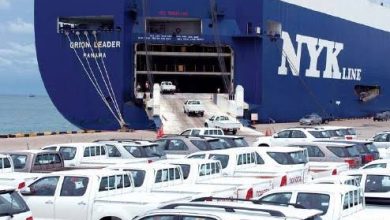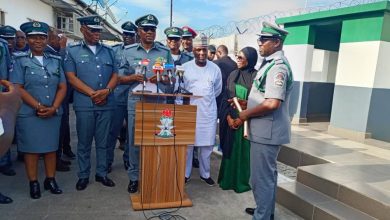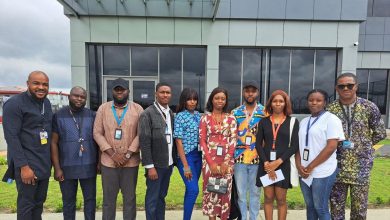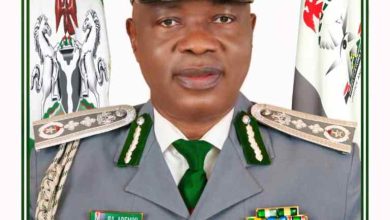Maritime
Customs trains media practitioners on commercial terms, phrases in Nigerian maritime industry
... Says global trading arena complex, dynamic
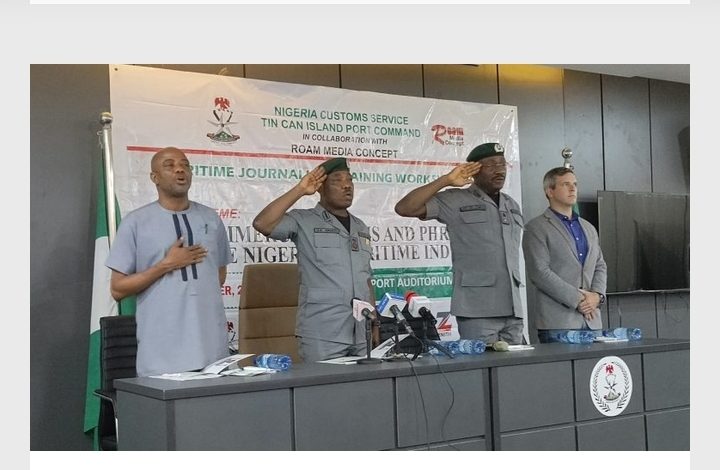
By Isapa Toromoyan
The Nigeria Customs Service (NCS) last week organised a one-day training workshop for maritime journalists on the need to understand the commercial terms and phrases in the Nigerian maritime industry.
This is even as the Service pointed out that the global trading arena has become very complex and dynamic, especially due to increasing technological advancements.
The training, which was in collaboration with Roam Media is in line with the current management’s robust stakeholders’ engagement and capacity building.
Speaking at the event, Comptroller General of Customs, Bashir Adewale Adeni, who was represented by the Controller, Tin Can Island Area Command of the Service, Comptroller Dera Nnadi, said that the emergence of technological advancement across the globe has more than ever before made international trade and commerce more complex and dynamic.
Comptroller Nnadi, who wears two caps at the event as the co-convener of the workshop said that the nation’s maritime industry has also over the years gone through significant changes, a development that makes capacity building, training and retraining of not only officers of the Service bust also media stakeholders that cover the industry imperative.
“The advancement in technology coupled with a shift in global trade patterns with the attendant new regulatory frameworks have brought about new terminologies that impact Customs operations and how it collaborates with stakeholders, including the media.
“We stand at the cross section of trade innovations and regulatory practices that shape our global requirements. The maritime industry has also gone through significant changes over the years driven by advancements in technology, shift in global trade patterns and informing regulatory frameworks and with these come new terminologies that may not only impact on Customs operations, but also how we collaborate with other stakeholders.
“Today, we explore essential vocabularies that underpin our work, helping us to navigate through the complexities of Customs procedures, trade compliance and international logistics. Understanding these terms is not just a matter of semantics but also crucial in enhancing efficiency, fostering transparency and ensuring compliance in our operations. I therefore encourage participants to engage actively and share insights.
“Your expertise as maritime journalists is invaluable in disseminating accurate information on educating the public on the vital role played by Customs in facilitating trade and enhancing economic growth. Together, let us deepen our understanding of the language that drives our industry forward and strengthen the partnership that would help us meet the challenges of the future,” he added.
However, he said that the current management of the Service, which is largely populated by former Public Relations Officers of the Service is committed to training and building capacity for the media stakeholders to boost accurate reportage of the industry.
Conversely, he thanked the CGC for graciously approving the proposal for the training of the journalists, pledging that such trainings would be more regularly to sharpen their reporting skills.
Also speaking at the event, Customs Area Controller Apapa Command, Comptroller Babatunde Olomu, implored the media practitioners to make the best out of the training session.
He emphasized the commitment of the Service in bringing the maritime media up to date on new trends in the global trade arena.
Meanwhile, the convener of the event, Mr. Innocent Orok, said that what brought about the workshop was as a report published in a newspaper, which claimed that there were certain manual operations in Customs cargo processes, which had been eliminated since 2006 when the service began its automation processes.
He revealed that Comptroller Nnadi, who also saw the report and drew attention to it, expressly agreed that there is urgent need to train maritime journalists for them to properly educate the public.
“On Sunday August 10, 2024, Comptroller Nnadi posted a story link published in a Saturday newspaper by a reporter in Awka, Anambra State with the headline “Challenges in Ports: Ezeibe points way out for Customs.”
“The report had the photograph of the CG Customs. The summary of the story was that Customs causes delays in the clearance process to extort money and the delays lead to demurrage, which add to the cost of goods in the Nigerian markets. Beneath the story link, Comptroller Nnadi wrote see why we must leave maritime reporting for the maritime media personnel.
“Comptroller Nnadi’s position was that the issue the journalist was writing about had been addressed over 20 years ago, with various Customs trade facilitation/ ICT tools such as Pre- Arrival Assessment Report (PAAR), Asycuda, NICIS and now B’ Odogwu, which are all trade facilitation tools put in place by the Customs to fast- track clearance of goods from the seaports.
“In a sharp response, I reacted by saying it was because journalists are not trained that is why they are reporting backward trends. In his usual character, Comptroller Nnadi responded, Innocent man, I nominate you chairman of capacity building for the media for a one -day workshop on “Commercial Terms and Phrases in the Nigeria Maritime Industry,” he explained.
Meanwhile, Deputy Managing Director of
Mediterranean Shipping Company (MSC), Jacob Iosso, said that that the company handled export consignments of over 40,000 Twenty Equivalent Units of agricultural products in the last 12 months.
He said that the volume of goods handled by the company the year before has increased this year, saying the export goods which are mostly agricultural produce, were shipped to different countries globally.


